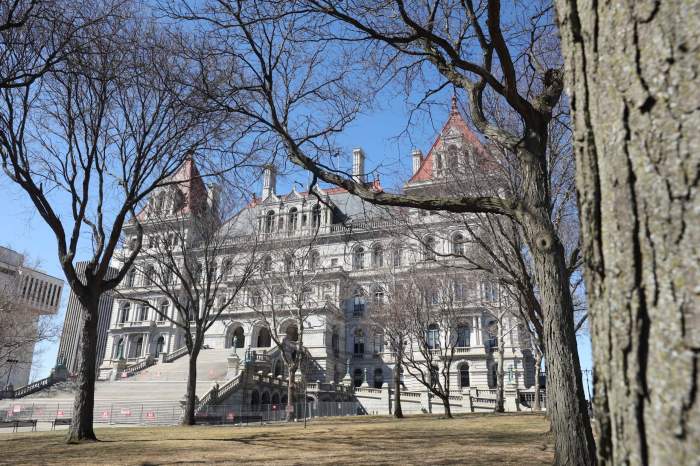Same-sex couples are more likely to live in states with higher home prices, according to a new report.
At the same time, the report found that same-sex couples are possibly more likely to have their mortgage applications denied or receive higher interest rates than straight couples.
The same states with high home prices are also more accepting of same-sex couples and have laws that protect LGBTQ people than queer couples who own homes in states where rights are practically nonexistent and safety is a real risk, said Jacob Channel, a senior economist at LendingTree.
Channel, a 27-year-old queer man, authored LendingTree’s first-ever same-sex couples homeownership report, published June 7, using data from the United States Census Bureau’s 2020 American Community Survey.
Preliminary findings of the median value of homes in the top 10 states with the highest proportion of homeowning same-sex couples are $116,730 more expensive than in the top 10 states with the fewest number of same-sex coupled homeowners, according to the Charlotte, North Carolina-based online lending marketplace’s report.
The top 10 states where same-sex couples occupy the greatest share of coupled households are Vermont, Massachusetts, New Mexico, Delaware, Oregon, California, Maine, Nevada, New York, and Washington. South Dakota, North Dakota, and Idaho top the list of the 10 states with the least same-sex couple households.
However, not all states are made equal in rights, acceptance, and home values, Channel discovered.
He found that in New Mexico, the state that ranked third for having the highest number of same-sex couple households, the median home value was $175,700. That was nearly $60,000 less than the median home value in Idaho, which tied for the second-smallest share of same-sex couple households. The median home value in Idaho is $235,600.
“It’s a trade-off that a lot of people in the LGBTQI+ community have to figure out how to navigate between,” said Channel who lives in New York City with his partner.
However, Channel said what the census data revealed didn’t surprise him. What struck him was “how little demographic data on this subject exists,” he said.
Channel continued pointing out several potential problems with the data. He noted there are very few numbers about same-sex couples in every single state, a lack of historical data and financial data, possibly “holes” in the data, and potentially under-reporting that could skew the information.
“While we don’t have perfect data right now, I do think that the study does highlight that there are real issues that folks in the LGBTQI+ community should be aware of,” he said hoping that the data gathered by the census will improve in the future. “Hopefully, over time we’ll be able to shed more light on those issues and resolve them.”
What the data showed was the high price tag many LGBTQ people are paying whether they can afford to or not.
Channel pointed out the pros and cons of the high price of safety and acceptance versus the risk of affordability, especially in the face of higher interest rates and mortgages.
Weighing affordability versus discrimination, lack of rights, and safety versus biting the bullet to relocate to or stay in states where home ownership and the cost of living are high, but discrimination is low, legal protections are in place, and living openly is accepted.
Safety and being comfortable living authentically “is a very tangible, very real-world concern,” Channel said.
“I think that often, people in our community are willing to pay a little bit of a premium or maybe are even forced to pay a premium on things like housing because the alternative can be really bad and really dangerous,” he said.
Yet, Channel expressed concern about the challenges with that premium. Same-sex couples, for example, might be denied a mortgage or offered a higher interest rate, despite laws against discrimination in some states.
“There is a very real possibility that same-sex couples, generally speaking, across the country might find themselves in situations where they do have to wait a little bit longer before they’re able to become homeowners,” he said, “or they have to search a little bit harder to find something that’s actually in their price range.”
In terms of discrimination, Channel said, “It is one of those things where certainly having laws on the books can help reduce these kinds of things, but they’re not perfect. We do have data evidence to indicate that mortgage discrimination does exist.”
This is where documenting and reporting discriminatory acts can help the entire community.
“The more people who speak out about something, I think the more likely it is that regulators and even lenders themselves will become more aware of these issues and will take steps to resolve these issues,” he said.
Something that is “really easy to overlook,” Channel said, is that same-sex couples can be dollar smart by assessing whether to put their best financial foot forward and apply for a joint mortgage or not. He also advises shopping around for a mortgage alongside the broker your real estate agent recommends and making sure you are getting the best rate and value.
“It can be really an important thing for you to do, especially for someone who does find themselves living in a high-cost part of the country where really any extra help can make a big difference in terms of how they are able to afford a house,” Channel said.



































